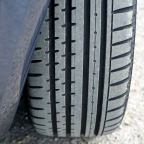
A quick guide to selling your car
If you’re raising funds for a new car, selling it privately can earn you more money than selling it to a dealer. Here, car insurance experts, mustard.co.uk, share some top tips that can help you sell your car quickly and smoothly.
Check your paperwork is in order
Needless to say, you must have the right to sell the car and it must match the description on the V5C (vehicle logbook). If you’re selling the car to be driven (as opposed for parts only) then it must also be roadworthy.
If the car is three years old or more, you should have all its MOT certificates available, along with its service record. It’s worth knowing that if the car’s been serviced by an official dealer and has had its service book stamped accordingly, this can help increase the value of the car. If you’ve had any work or repairs carried out, you should also gather receipts for this.
Preparing your car for sale
If you can afford to, having your car professionally detailed can help increase its saleability, and it’ll also save you from doing it. It’s also a good idea to sort out any damaged paintwork or chips in the windscreen.
If there are any minor issues, it could be worth your while sorting these out before the sale. For example, make sure windscreen wipers leave the screen smear free and that tyres still have a decent amount of tread depth left. If not, you should expect buyers to haggle the price down accordingly.
Advertising your car
Before listing your car, check how much others of the same make and model are selling for on the second-hand market. This will ensure it’s priced reasonably but don’t forget to give yourself some wiggle room as buyers often like to haggle.
You should also aim to provide as much detail as possible. Being vague can mean you end up fielding dozens of queries. But remember that any details you do provide, must be factually correct.
Information you should put in your advert includes:
- The year of registration or plate number
- Price
- Car make, model and colour
- Transmission type (manual or automatic)
- Fuel type
- Mileage
- Overall condition
- Any features that might appeal to buyers, for example, sat-nav, built-in dog guard or Isofix fittings.
- Number of months left on its MOT (if applicable)
Making the sale
Genuine buyers will no doubt want to see the car in real life so arrange an appointment where you’ve got time to discuss the car with them. Rushing simply means you’ll feel stressed which could jeopardise the sale.
Most buyers will also want to test drive the car, if they do, they must have appropriate car insurance. If they already have an insurance policy in place, they may have a feature called ‘driving other cars’ (DOC) which allows them to get behind the wheel with the owner’s permission. If they don’t, they’ll need to arrange temporary cover, which can be arranged for as little as one hour.
It’s strongly recommended that you accompany potential buyers on a test drive. If you can, it’s also worth having a friend or family member come with you too for safety and peace of mind.
If you agree to a sale, a bank transfer is the safest and most efficient way for you to get paid. The fastest method is viaCHAPS (Clearing House Automated Payment System) which processes transactions within hours, although there is a fee.
If you’re being paid by any other method, for example, by cheque, make sure it’s cleared before you hand over the keys.
You should also provide a receipt and include a note to say the buyer has seen the car and test driven it (if this is the case).
Ensuring safety and security
Sadly, there may well be people that approach you with ulterior motives looking to clone details of the car.
To keep your details safe, you should not:
- Provide anyone with the vehicle identification number (VIN)
- Let anyone take copies of your V5C logbook
- Leave any potential buyers in the car alone with the car keys
On the other hand, you should:
- Check driving licences of potential buyers if they want to test drive the car
- Take the buyer’s contact details
- Ask buyers to come to you rather than you taking the car to them
Tell DVLA about the sale
When you sell the car, you should give the new owner the green ‘new keeper’ section of the V5C. You’ll then need to tell the DVLA you’ve sold the car, this will automatically entitle you to a refund of any remaining full months of car tax.
You’ll also need to cancel your car insurance with your provider, in most cases you can do this by phone or email. If you’re due a refund, your insurer should also arrange this on your behalf.













